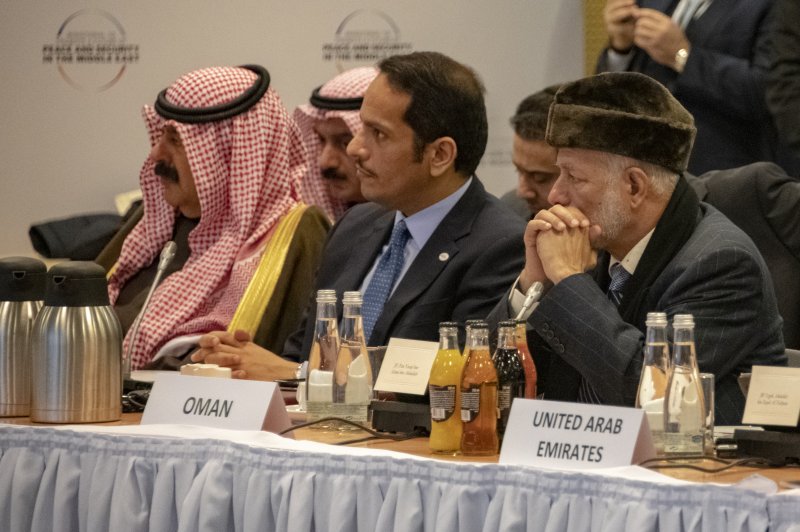Foreign Minister of Oman Yusuf bin Alawi bin Abdullah watches as U.S. Secretary of State Mike Pompeo delivers opening remarks at the Ministerial to Promote a Future of Peace and Security in the Middle East, in Warsaw, Poland on February 14. Photo courtesy of the State Department/Flickr
Feb. 25 (UPI) -- The Warsaw conference held on Feb. 14-15 was described by U.S. Secretary of State Mike Pompeo as promoting "stability and peace, freedom and security" in the Middle East.
On the other hand, the conference, aimed at putting pressure on Iran, was described by Hassan Nasrallah, the secretary general of Hezbollah, as a platform to pull the plug from the Palestinian cause. This can seem logical, especially that Palestine, similarly to Iran, had no representation at the conference.
Facing the increased pressure, Iran will probably increase its effort to mobilize its base in Iran as well as in the Arab world. Sanctions relief is not enough of an incentive for Iran to back down on its belligerent behavior. If the Iranian regime loses face and seems that it has traded its principles for material relief, it will lose legitimacy. Therefore, the Iranians should be offered a graceful exit from their regional entanglements in order to enter into a deal with the United States. A fair deal with the Palestinians can create this exit.
Trump rejected the Iran deal on the basis it is a "bad deal." In his State of the Union address, Trump described Iran as a state that chants "death to America" and pledges genocide to the Jewish people. He also said that he is open to negotiate a new deal with Iran.
However, what is the likelihood of Iran coming to the table? Not much. The U.S. administration needs to understand that the Iranian regime is not built on an utilitarian foundation. It is based on ideology. The Iranian regime, like any other regime, struggles for self-preservation and for legitimacy. The legitimacy is not derived from providing citizens with high standards of living but from cherishing the principles on which the revolution was founded. Ayatollah Khomeini had a very famous saying when people asked him about the economy. He used to reply that the Islamic revolution did not start to slash the price of watermelon.
The regime is likely to use the sanctions to generate propaganda and to denounce America for the deteriorating economy and to blame the bad living conditions of the Iranians on the U.S.-imposed sanctions. Though the sanctions exert pressure on the regime, pressure alone is not enough to coerce the Islamic republic to change its attitude.
Despite the JCPOA that was reached in order to free the country from the burden of the sanctions, mosques in Iran were still chanting "death to America." This appalled the American public, as well as policymakers. Though Iran partly relinquished on its nuclear program, its support for problematic proxies in Syria, Iraq, Yemen and Lebanon did not change. This is why, Trump described the deal as a bad one.
Again, though such a behavior seems schizophrenic from Iran, it is quite understandable. The regime did not want to seem that it has traded its core beliefs, its creed for the lifting of the sanctions. To understand the Iranian regime, it is important to understand Shia Islam. Shia Islam is centered around the idea of justice and the struggle against injustice. This is why, since its inception, Khomeini adopted the Palestinian cause, a cause that is dear to every Muslim in the world. He named the most important legion of the revolutionary guard as the Quds brigade. Today, the expansionist policy is projected to the supporters of the Iranian regime as an episode in the grand plan of the liberation of Palestine. Hence, Hasan Nasrallah, Hezbollah's secretary general, claims that the road to Jerusalem passes through Aleppo in Syria.
However, if the United States offers the Palestinians a fair solution, the perspective can change. As explained by one Iran expert, a fair deal with the Palestinians will give the Iranian expansionism less room to breathe. In Iran, there are two groups, one that wants to normalize with the West and the United States. Those are mostly the reformists. The other group are the hard-liners who do not want to normalize with the West and the United States.
The first group does not want to seem as backing down on the pillars of the Islamic revolution in order not to lose face. The other group uses the issue of Palestine in order to give legitimacy to Iran's aggressive behavior. A fair deal with the Palestinians will give the first group an excuse to change its behavior without losing legitimacy. As for the second group, it will deprive them of the excuse they hold to justify their expansionism.
Now that the Trump team is preparing the deal of the century, which so far remains secret, it is important for them to note that a fair deal with the Palestinians can lead to a "good deal" with the Iranians.
Dania Koleilat Khatib is an affiliated scholar at the Issam Fares Institute for Public Policy and International Affairs at the American University of Beirut. She specializes in U.S.-Arab relations and researches sectarianism, extremism and governance. Her book "The Arab Lobby and the U.S.: Factors for Success and Failure" was published by Routledge UK and translated to Arabic.















